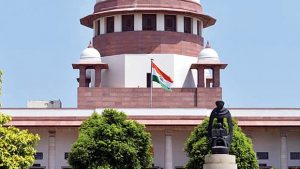Janjivan Bureau / New Delhi : The Supreme Court on Tuesday refused to entertain petitions against alleged police excesses against Jamia Millia Islamia and Aligarh Muslim University students protesting against the Citizenship Amendment Act, 2019, saying it can’t act like trial courts.

A Bench headed by Chief Justice of India SA Bobde left it to high courts to deal with petitions on the issue. High courts may appoint proper fact-finding committees that may include retired judges, said the Bench.
High courts would pass appropriate orders after hearing the Centre, states and the petitioners, it said. The Bench said the top court can’t be called upon to first determine facts and then pass orders.
“We aren’t trial courts,” CJI Bobde said.
On petitioners’ demand to restrain thr police from entering campuses without permission of the Vice Chancellor concerned, the Bench said high courts would look into this issue as well.
It also refused to order a stay on arrest of students before they moved a high court.
“Are you trying to say that no action should be taken if anyone is found violating law and order? We are not allowing anyone to commit any offence,” it said.
As protests against the Citizenship Amendment Act, 2019 continued in various parts of the country, the Supreme Court had on Monday taken strong exception to rioting and damage caused to public property during the stir.
A Bench headed by CJI Bobde had said the court won’t be bullied and it can’t be held to ransom while public property was destroyed. Just because the protesters were students, they can’t take the law in their hands, he said.
The protesters are opposing the amendment that relaxes norms for grant of Indian citizenship by naturalization to Hindu, Sikh, Christian, Buddhishst and Jain and Parsi victims of religious persecution in Pakistan, Afghanistan and Bangladesh who came to India before December 31, 2014.

Students of Jamia Millia Islamia and locals protested at Jamia Nagar in Delhi on Sunday against CAA. Protesters torched four buses and two police vehicles as they clashed with police in South Delhi New Friends’ Colony.
Police baton charged the protesters and used tear gas shells to disperse the mob and entered the varsity campus, detaining several persons allegedly involved in the violence.
On Tuesday, the top court said high courts would also deal with complaints of FIR against students and non provision of medical treatment for the injured students.
Solicitor General Tushar Mehta told the Bench that 67 persons, including students and miscreants, were taken to hospital.He said several policemen were also injured. Mehta said no students was arrested or was sent to jail.
“Police officials are present here. They know their responsibility. Medical treatment was given for free and Jamia Proctor was asked to come to identify his students and was allowed to take them back, Mehta told the Bench.
During the arguments, which witnesses heated exchange, senior advocates Colin Gonzalves and Indira Jaisinh tried to impress upon the Bench to appoint a fact-finding committee of judges.
They also wanted it to pass an order to ensure that police didn’t enter campuses without permission from the Vice Chancellor concerned.
But the Bench left it to be dealt with by high courts.

















